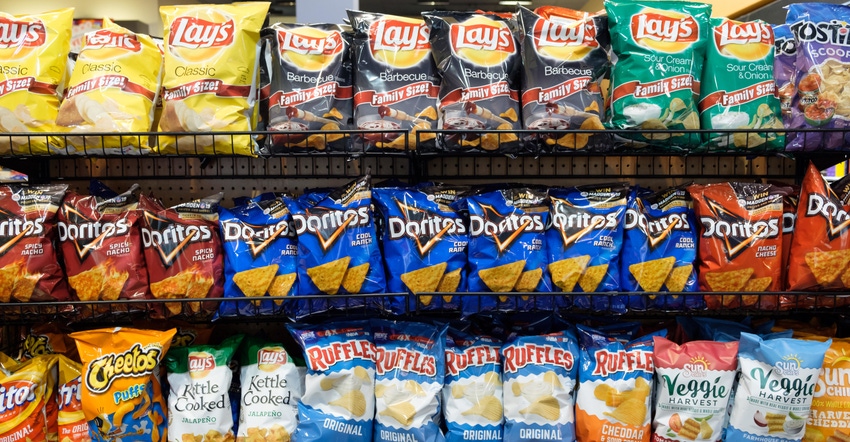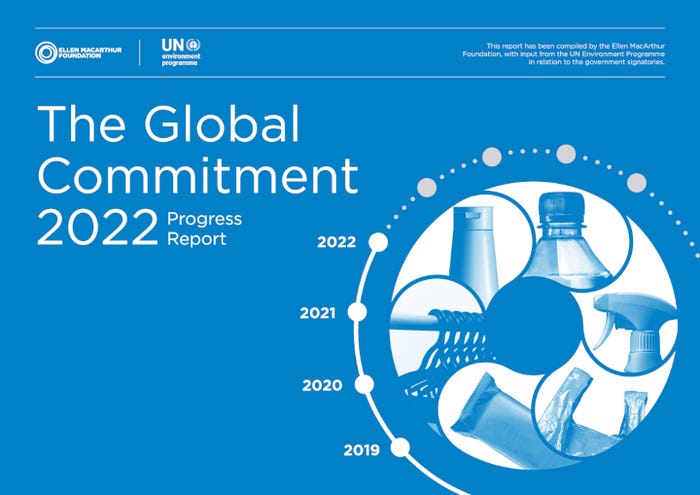A tweet from the Ellen MacArthur Foundation calls on businesses to prioritize “eliminating and innovating away” from flexible packaging to fight plastic pollution — and that’s just nuts.

Shocking. Unbelievable. Draconian. Those are just some of the reactions to recent news. On November 8, the globally influential Ellen MacArthur Foundation told businesses that they should dis flexible packaging because it doesn’t meet the foundation’s 2025 sustainability goals of being recyclable, reusable, or compostable.
What are they thinking?! Packaging sustainability is not and should not be limited to reusable, recyclable, or compostable. What about renewable materials or recycled content — or material reduction, which flexible packaging excels at. All efforts are necessary to help reduce packaging’s impact on the environment. And packaging reduction is usually or should be the first thing brands consider as a positive impact on sustainability.
“[P]ackaging reduction is usually or should be the first thing brands consider as a positive impact on sustainability.”
The tweet was promoting EMF’s recently released report on progress of the Global Commitments. Overall, the news was rather sad (to quote a Beatles tune), but especially for flexible packaging. The Foundation writes: “Flexible plastic packaging, such as sachets and films, pose a significant problem. The difficulty of recycling them — in practice as well as at scale — is a key reason why most businesses will miss their target of using only reusable, recyclable, or compostable plastic packaging by 2025.”

I reached out to the Foundation to get clarification on their statement. Unfortunately, no one was able to talk with me within my deadline. But we have agreed to connect, and I hope to share more from them once we do.
So far, only one Twitter user retweeted the EMF tweet with an added comment:
I’m sure more people will respond to this news as it gets shared.
Sustainable packaging experts weigh in.
Instead of waiting, I asked a couple experts on sustainable packaging what they thought of this. Here’s what they had to say:
Flexible Packaging Association: Alison Keane, FPA President/CEO, responds, “While [the progress report] appears to be targeting flexible packaging — and certainly the tweet is provocative — it really isn’t anything new and its solutions, including elimination, merely point to their Flexible Report from earlier this year.
“Short sighted elimination policies for this type of packaging, and really all packaging in general, will not solve the problem [of plastics pollution] and in many cases will result in more environmental harm.”
Keane’s response to that Flexible Packaging report was published in the association’s magazine FlexPack Voice at the end of August. In the article “Why ‘Elimination’ Won’t Solve the Packaging Pollution Problem,” she itemizes the flaws in this recommendation and reminds readers of the sustainable advantages of flexible packaging, especially when compared to alternatives.
“So, flexible pack creates ‘less waste in the first place,’ uses less virgin resources and creates less greenhouse gas emissions. And even EMF agrees that much of it can’t and shouldn’t be eliminated. So, what do we do with the rest? Again, FPA agrees with EMF — the answer is unprecedented efforts to scale recycling systems. Recycling does work, but in the US, our system is decades old and for far too long relied solely on a failed policy of exports, particularly plastic exports, instead of investment in domestic infrastructure,” Keane says. “FPA supports well-crafted extended producer responsibility (EPR) as does EMF in order to subsidize that investment and create sustainable funding for a dynamic recycling system that includes advanced recycling technologies, including mechanical and chemical.”
Keane’s conclusion: “FPA may not always agree with EMF, but in this case, yes, let’s agree that where we can use more sustainable packaging types, let’s do so. But for the 90% of flexible packaging that cannot be eliminated without unintended consequences, investment in recycling and composting infrastructure is the key to eliminating plastic and packaging pollution.”
SPRING (Sustainable Packaging Information Networking Group) Executive Director Bob Lilienfeld: “I have two reactions to this.
“First, this appears to be an attempt by EMF to draw attention away from its failing 2025 recycling/recycled content program. They’re simply replacing it with something else that isn’t going to be (easily) accomplished but will continue to generate interest in them.
“Second, it indicates how the flexible packaging industry has become a victim of its own success. The benefits of significant lightweighting led to replacement of rigid containers to such an extent that flexible packaging discards became large enough to generate public concern. This is the paper vs. plastic bag story all over again.
“Sadly, the flexible folks never told their story to the public in ways people could internalize the benefits.”
Sustainable Packaging Coalition: They had no comment at this time by my deadline.
AMERIPEN: Executive Director Dan Felton respectfully declined to comment at this time, except to say, “… we of course do not support the elimination of any packaging formats or materials.”
Everyone’s voice should be heard on this one. What do you have to say?
About the Author(s)
You May Also Like




